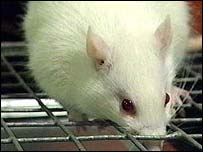![]()
|
Hormone 'makes mother protective'
Sunday, 1 August, 2004, 23:10 GMT 00:10 UK
|
|||
Studies in mice showed mothers with low levels of the hormone CRH were more protective of their offspring than those with high levels of this hormone. High CRH has been linked with postnatal depression and may explain neglect of offspring in some cases, say the University of Wisconsin team. Their findings are published in the journal Behavioural Neuroscience. Lead author Stephen Gammie said: "If CRH needs to be low to see maternal protection of offspring, as our work suggests, then it explains why mums with high postpartum depression and high CRH not only may neglect, but also may abuse, their children." Scientists have known that fear and anxiety decrease when a mother is lactating. Fearless Dr Gammie and colleagues in the department of zoology wondered whether this reduced sense of fear might explain why mothers fiercely protect their offspring in even the most dangerous situations. Corticotropin-releasing hormone (CRH) is involved in the body's response to fear and anxiety. The team tested whether altering CRH levels in female mice that had recently given birth to pups would change the mothers' behaviour. Under normal conditions, female mice with pups attack male mice because they can be threat to their offspring. In the study, only mice that received either no dose or a low dose of CRH behaved in the normal way, attacking male intruders.
Higher levels of CRH appeared to block this protective behaviour. Mice with the lowest levels of CRH attacked more than 20 times over 45 seconds. Mice with moderate levels attacked about six times over eight seconds, but mice with the highest levels of CRH did not attack at all. Other maternal behaviours such as nursing were unaffected however. Dr Gammie said: "Low CRH levels appear to be a necessary part of maternal aggression. If you don't keep them low you won't see this fiercely protective behaviour. "You see this protective behaviour across the species. Mice do it, birds do it and so do humans. "It's a stretch from mice to humans but because this behaviour is so conserved between species it's not unreasonable to think this might be similar in humans," he said. But Heather Welford from the National Childbirth Trust said most women with postnatal depression did not neglect their babies and that PND was more complex than simple biochemical imbalances. "Postnatal depression, of all degrees of severity, is known to have many social and emotional aspects which are not accounted for in studies like this. "Maybe we can treat women with the right cocktail of drugs to reduce whatever excess is present. "But as an explanation of why some women suffer badly with
postnatal depression, it doesn't get us very far," she said.
|
|||
http://news.bbc.co.uk/2/hi/health/3870735.stm
